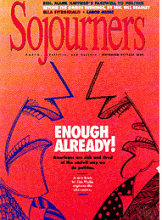When I showed a friend Haunted Marriage: Overcoming the Ghosts of Your Spouse's Childhood Abuse, he perused the book jacket and laughed, saying, "I guess everybody really is a victim." It was an insensitive comment, but one that is understandable, given our warped popular culture. It can be tiresome distinguishing which new categories of abuse and their associated healing strategies represent legitimate advancements, and which ones were crafted by the hacks behind Jerry Springer and Ricky Lake. But read Haunted Marriage and there is no doubt into which category this important book falls.
Authors Clark Barshinger, Lojan LaRowe, and Andres Tapia raise the specter of "spouses of sexual abuse survivors." Using Tapia's own marriage as a book-length case study, Barshinger and LaRowe—a husband-wife team of psychotherapists with 25 years of counseling experience—make the case that the abuse-surviving spouse isn't the only spouse in need of attention and healing.
In particular, Haunted Marriage makes clear that the abuse survivor's crisis often triggers a crisis for the spouse. Four years into their marriage, Tapia's wife Lori uncovered repressed memories of being sexually abused as a child. Hers was a painful and dark path of recovery. But not long after Lori began her process of recovery, Andres discovered great needs of his own:
In the same way that Lori projected onto me her unresolved feelings about her abuser, I was projecting onto her my unresolved feelings about my parents....As Lori and I tried to find each other in the haze of her healing process—and my growing realization of the process I needed to embark on for myself—we kept bumping into relational ghosts from our past.
Read the Full Article
